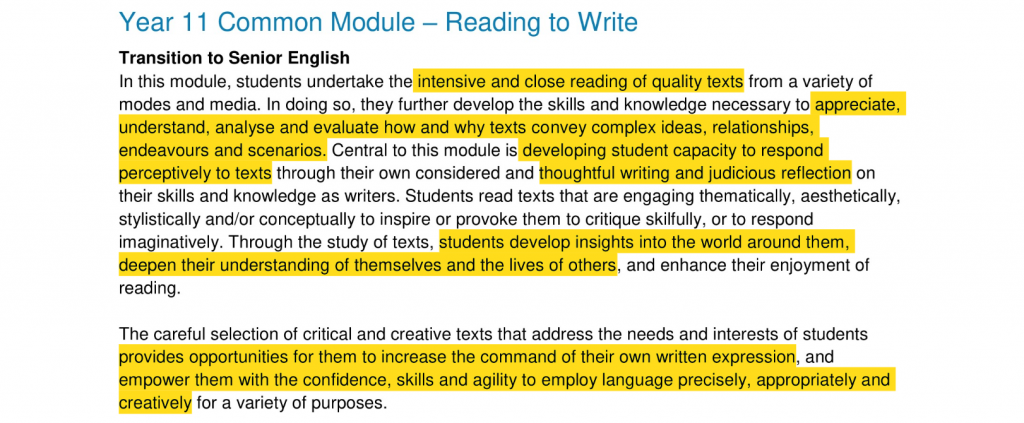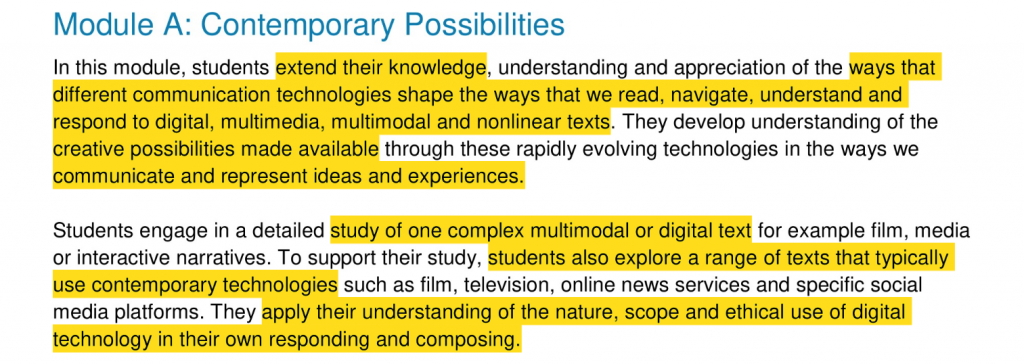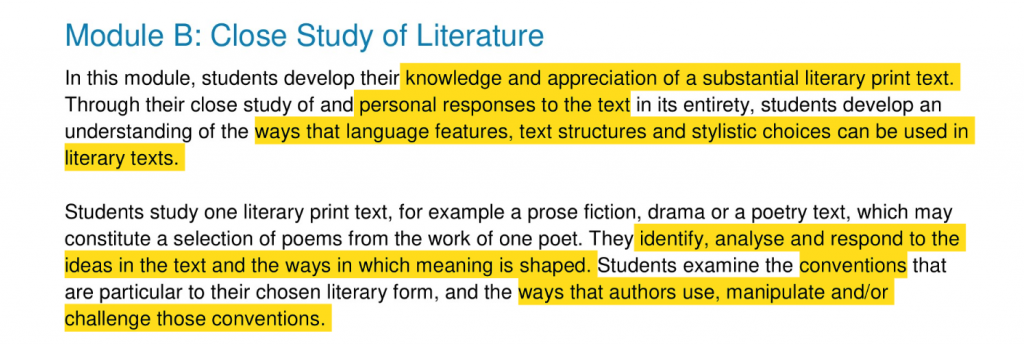
Just started Year 11 Standard English and need a breakdown of the year ahead? Or maybe your’e halfway through and need a bit of guidance?
You’ve come to the right place!
In our Band 6 guide, we’ll lay down the foundations for strong writing skills and breakdown the modules for you, as well as throw in some practice questions to get you started!
So, what are you waiting for? Let’s jump in!
Part 1: Developing Essential English Skills
Part 2: Guide to the Common Module
Part 3: Guide to Module A
Part 4: Guide to Module B
Part 1: Developing Essential English Skills
Before we can dive into the Year 11 Advanced English modules, it’s important that you have a strong foundation when it comes to writing an essay and analysing your texts.
How to Write a Band 6 HSC English Essay
When writing an essay, you want to be able to develop a strong argument that is supported by the best possible pieces of evidence with great analysis, all organised in a great structure.
Obviously, this is much easier said than done! Although, that’s why we’ve created a guide to writing a Band 6 essay in HSC English that you can find below:
Your Guide to Writing the Ultimate Band 6 Essay
If you want to brush up on your thesis writing skills, you may want to check out the article below!
How to Construct a Strong Thesis Statement in Your HSC English Essay
How to Analyse Your Text
The next key step is developing your analytical skills! This is pivotal as analysis will underpin anything and everything you write in English, from short answer responses to essays.
To have strong analytical skills, you need to be able to identify key ideas in a text and elaborate upon these, whilst finding literary techniques that will add meaning to your analysis.
For a recap on how to achieve this, you can check out our article to analysing literary texts like a pro below:
How to Quickly and Flawlessly Analyse English Texts
We’ve also got a great article specifically on how to analyse poems if you need a hand below:
How to Analyse your English Poem
If you’re analysing a visual text, be sure to look over our guide to analysing them!
How to Analyse a Visual Text
Knowing Your Literary and Visual Techniques
The last step to building up your set of English skills is being able to identify literary and visual techniques.
You’ll find these in any text you study, including novels, poems, films, prose and even art!
For a quick brush-up on these devices, you can take a look at our master list of literary techniques below:
The Literary Techniques Master List
We’ve also got a definitive list of visual techniques to know!
The Visual Techniques Master List
Now that you’ve nailed those essential English skills, we can dive into breaking down each of the Year 11 Standard English modules!
Part 2: Guide to the Common Module: Reading to Write
A Common Module means that both Standard and Advanced English students will study this module!
Reading to Write is all about the basics of writing, especially developing your reading and writing skills.
Let’s take a look at the syllabus for some further details:

Essentially what this means is that you’ll study a range of texts, to understand how and why they may convey certain ideas, relationships and scenarios.
The goal of this module is that you learn how to use language confidently and skillfully!
For a more in-depth look into the common module, you can read our guide on it below:
Guide to Year 11 Common Module: Reading to Write
Common Module Practice Questions
Once you’ve nailed the concepts and topics you explore in the module, you’re ready for some writing!
Get some essay writing practice under your belt with this practice questions we’ve specifically created for the Year 11 English Common Module below!
20 Practice Essay Questions for Year 11 English Common Module: Reading to Write
Part 3: Module A: Contemporary Possibilities
In a nutshell Module A: Contemporary Possibilities is all about how technology is able to create and shape new possibilities in the ways we communicate and represent ideas or experiences.
It’s more than likely you’ll be studying texts that either discuss new technologies or have been created using contemporary technology.
Let’s take a look at the syllabus below for some more details!

According to the syllabus, you’ll also be looking at the ethics of digital technologies as well as the nature (what digital technologies are) and the scope (how far-reaching these technologies are) in your study of this Module.
For an in-depth look at Module A, check out our Band 6 Guide to acing Contemporary Possibilities below!
The Guide to Year 11 Module A: Contemporary Possibilities
Module A Practice Questions
The best way to test your knowledge in English is practising writing essays!
That’s why we’ve created 20 practice questions for Year 11 Standard English Module A to keep your essay writing skills up!
20 Practice Questions for Year 11 English Standard Module A
Multimodal Texts and Presentations
You may find that you have to study a multimodal text in Year 11 Standard English Module A.
You may be thinking “what on earth is that?!” But don’t fret!
We’re here to give you the low-down on multimodal texts, which are essentially
For an extensive guide to learning how to respond to a multimodal text, check out our article below!
How to Respond to a Multimodal Text for Year 11 English
You may also find that you have to give a multimodal presentation in this module or one of your other modules.
Multimodal presentations are a completely new form of assessment that NESA added with the new syllabus changes.
It mainly involves giving a digital presentation i.e. something to the likes of a PowerPoint or iMovie presentation with a voice over.
To find out how to nail these, check out our article on multimodal presentations!
How to Ace Your Multimodal Presentation for HSC English
Part 4: Module B: Close Study of Literature
Year 11 Standard English Module B: Close Study of Literature is about getting to know your prescribed text like the back of your hand.
In this module, you’ll be developing an in-depth knowledge of your text so you can write personal responses about it.
Let’s take a closer look at the syllabus:

In other words, you’ll be closely analysing language features, the structure of the text and its style to develop your response.
You’ll also study how authors use, manipulate or challenge conventions relevant to their text.
For a more in-depth guide to Year 11 Standard English Module B, check out our Band 6 guide below!
Guide to Year 11 Standard English Module B: Close Study of Literature
Module B Practice Questions
As with every other module in Year 11 Standard English, practising writing essays is essential!
That’s why we’ve created 20 general practice essay questions for you to work with!
20 Practice Questions for Module B: Close Study of Literature
And that wraps up our ultimate Band 6 guide to Year 11 Standard English! Good luck!
Looking for some extra help with Year 11 English?
We pride ourselves on our inspirational Year 11 English HSC coaches and mentors!
We offer tutoring and mentoring for Years K-12 in a variety of subjects, with personalised lessons conducted one-on-one in your home or at one of our state of the art campuses in Hornsby or the Hills!
To find out more and get started with an inspirational tutor and mentor get in touch today!
Give us a ring on 1300 267 888, email us at [email protected] or check us out on TikTok!


